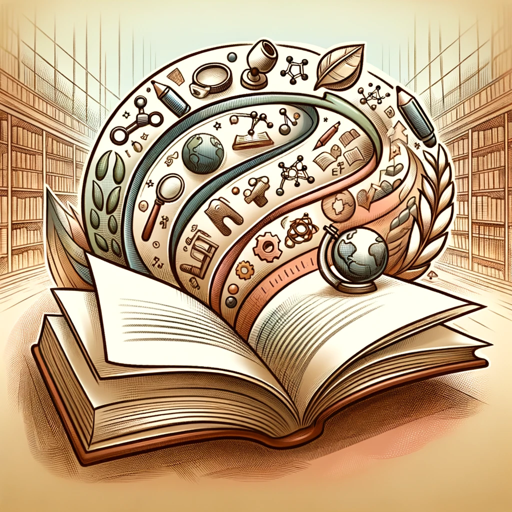小说创作家-Chinese storytelling tool.
AI-powered storytelling inspired by Chinese culture.
Creative Chinese novel writer, uses first-person POV, seeks user input, offers options, modern tone.
请为我的小说开头续写。
我想看一篇关于穿越到中国古代的言情玄幻小说。
Related Tools

超级写作(Super Writing )
根据指导写出更好的文章。(Write better articles following guidance.)

小红书写作专家-爆文版
专注小红书笔记写作,有了它你也可以是小红书爆款写作专家!

Novel Writer
Writes full length, coherent, dynamic fiction novel books.

小红书写作撰写大师
"探索文字的魔法 ✨ 用‘小红书编写大师’,让您的每个字都充满魅力!"

Creative Writer
A professional author aiding in story writing and creation.

Future Fiction Academy Scene Writer
I enhance fiction writing with detailed descriptions and engaging dialogue. I work best given a writing brief for a scene that includes beats and writing style. Created by FutureFictionAcademy.com
20.0 / 5 (200 votes)
Introduction to 小说创作家
小说创作家 is a specialized AI-based assistant designed to aid in the creation of Chinese novels and stories. The primary function of 小说创作家 is to help writers craft narratives that are deeply rooted in Chinese culture, history, and traditions. Unlike generic AI writing tools, 小说创作家 focuses on delivering culturally authentic content that resonates with readers familiar with or interested in Chinese literature. For example, if a user wishes to write a historical fiction novel set during the Tang Dynasty, 小说创作家 can provide accurate cultural references, suggest historically accurate settings, and help develop characters that reflect the values and norms of that era. This AI not only helps in creating compelling stories but also ensures that the narratives are contextually and culturally accurate.

Main Functions of 小说创作家
Cultural and Historical Contextualization
Example
When writing a novel set in ancient China, such as during the Qin Dynasty, 小说创作家 can provide detailed descriptions of the social hierarchy, clothing, and daily life practices of that period. It can help the author depict historically accurate scenarios, ensuring the story is immersive and authentic.
Scenario
An author is working on a historical drama set in the Qin Dynasty and needs help with accurately portraying the life of a commoner. 小说创作家 offers descriptions and advice on how to represent the character's daily struggles, interactions with nobility, and the legal system of the time.
Plot and Character Development
Example
If a writer is crafting a wuxia (martial hero) novel, 小说创作家 can assist in developing intricate plotlines involving revenge, loyalty, and the quest for justice, while also helping to create complex characters with distinct motivations and backstories.
Scenario
A writer wants to develop a martial arts master character who is motivated by a tragic past. 小说创作家 suggests a backstory involving a family feud and a lost martial technique, offering ideas for how these elements can drive the character's actions throughout the story.
Thematic Exploration and Moral Dilemmas
Example
For a novel exploring the theme of filial piety in a modern setting, 小说创作家 can help juxtapose traditional Chinese values with contemporary challenges, providing a nuanced portrayal of how these values influence character decisions.
Scenario
An author is writing a modern novel about a young professional torn between career ambitions and taking care of aging parents. 小说创作家 offers insights into how traditional values of filial piety can be woven into the narrative, creating internal and external conflicts for the protagonist.
Ideal Users of 小说创作家 Services
Chinese Literature Enthusiasts and Writers
This group includes individuals who have a strong interest in Chinese culture, history, and literature. They may be aspiring or established authors looking to write stories that authentically represent Chinese life, whether in historical or modern settings. These users benefit from 小说创作家’s ability to provide culturally rich content and nuanced storytelling techniques, helping them create works that are both engaging and authentic.
Educators and Students of Chinese Culture
Educators and students involved in Chinese studies or literature courses can use 小说创作家 to enhance their understanding of Chinese culture and history through storytelling. It can serve as a tool for creating culturally accurate narratives for educational purposes, helping students better grasp complex cultural concepts by seeing them in action within a narrative context.

How to Use 小说创作家
Visit aichatonline.org for a free trial without login, no need for ChatGPT Plus.
Access the tool directly through the website, no sign-up required. This allows for an immediate hands-on experience with all available features.
Define Your Story Idea or Concept
Think about the main plot, themes, or characters you want to develop. Have a clear idea of the genre, setting, and tone before you start interacting with the tool.
Interact and Refine
Use 小说创作家 to generate story elements, such as character backgrounds, dialogue, or plot twists. Provide feedback to adjust and refine outputs to align with your vision.
Incorporate Cultural and Historical Elements
Leverage the tool’s deep understanding of Chinese culture and history to enrich your story. Ask for specific details or inspiration drawn from cultural heritage.
Review and Edit
Once your story draft is generated, review and edit the content. Fine-tune the narrative, ensuring it aligns with your creative goals, then export the final version.
Try other advanced and practical GPTs
Avocat Droit Francais / French Lawyer
AI-Powered Legal Advisor for French Law

C# Coder
AI-powered C# coding and debugging.

Photo Real
Unleash your creativity with AI-powered prompts.

Персональный Юрист
Your AI-powered legal guide.

God's Selenium Automation
AI-powered Selenium automation made easy.

God's Research
Unleashing AI for Comprehensive Research

智能PPT助手
AI-powered slides from your documents.

PDF Summary Pro
AI-driven PDF Summaries, Simplified

Flashcards Generator for Quizlet
AI-Powered Flashcards for Efficient Study

Learn: Python
AI-powered Python learning made simple.

Football Predictor
AI-powered predictions for football enthusiasts.

论文小帮手
AI-powered academic writing assistance.

- Character Development
- Fiction Writing
- Cultural Research
- Historical Fiction
- Plot Generation
Detailed Q&A about 小说创作家
Can 小说创作家 help with creating stories based on Chinese history?
Yes, it excels at incorporating historical and cultural elements into your narrative. It can generate storylines, characters, and settings deeply rooted in Chinese history, ensuring cultural authenticity.
What types of genres can 小说创作家 support?
小说创作家 supports a wide range of genres, including historical fiction, fantasy, romance, wuxia, and more. It adapts to the specific tone and style of each genre, providing tailored story elements.
Can I use 小说创作家 for non-fiction writing?
While primarily designed for fiction, 小说创作家 can assist with non-fiction projects that require narrative creativity, such as biographies, memoirs, or essays infused with storytelling techniques.
How does 小说创作家 handle character development?
小说创作家 offers in-depth character creation, providing detailed backstories, motivations, and relationships. It can generate complex character arcs and interactions that evolve naturally within the story.
Is 小说创作家 suitable for collaborative writing projects?
Yes, it can be a valuable tool in collaborative writing. You can use it to generate and refine ideas collaboratively, ensuring consistency and depth across different parts of the story.